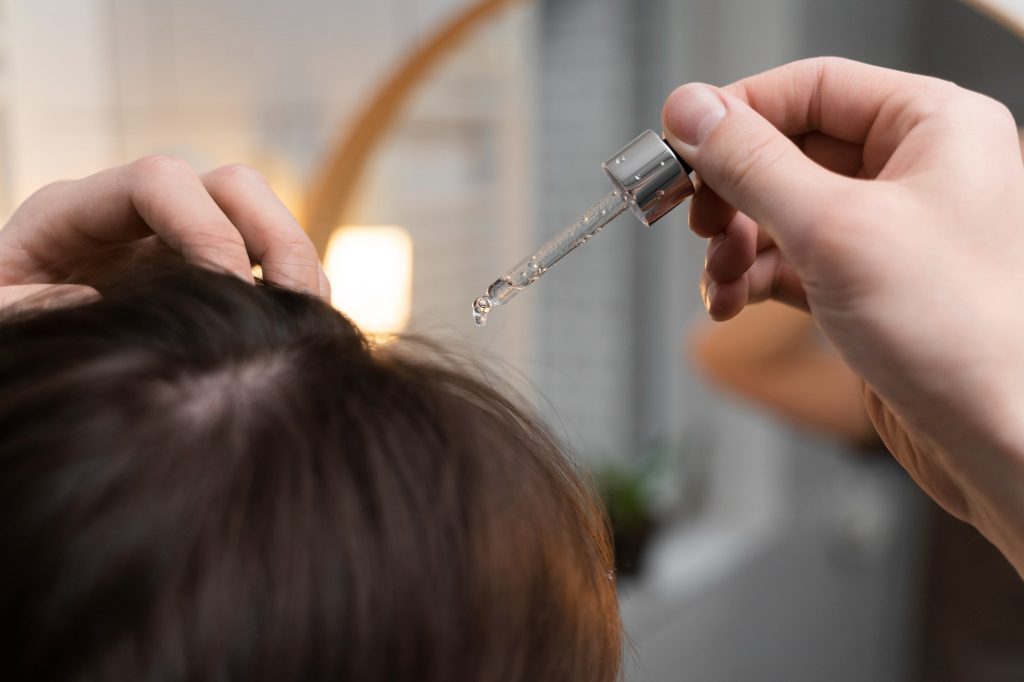Discover the potential link between diet and hair loss and explore whether making dietary changes can help prevent or reduce hair loss.
Can Changing Your Diet Prevent Hair Loss?

Hair loss is a common concern for many people, and it’s natural to wonder whether changing your diet can help prevent it. After all, our hair health is a reflection of our overall well-being, and what we put into our bodies plays a significant role. In this article, we will explore the connection between diet and hair loss, understand the causes and symptoms of hair loss, and discuss dietary changes and supplements that can potentially combat hair loss.
Understanding Hair Loss: Causes and Symptoms
Before we dive into the impact of diet on hair loss, let’s understand the science behind it. Hair loss can be caused by various factors, including genetics, hormonal imbalances, medical conditions, and stress. It can manifest as gradual thinning, bald patches, or excessive shedding.
Genetics play a significant role in hair loss. If your parents or close relatives have experienced hair loss, there is a higher chance that you may also be prone to it. Hormonal imbalances, such as an excess of dihydrotestosterone (DHT), can also contribute to hair loss. DHT is a hormone that can shrink hair follicles, leading to thinner and weaker hair.
Medical conditions can also be a culprit behind hair loss. Conditions like alopecia areata, which is an autoimmune disease that causes hair loss in patches, or thyroid disorders, can significantly impact the health of your hair. Additionally, certain medications, such as those used for cancer treatment, can cause temporary or permanent hair loss.
Stress is another factor that can contribute to hair loss. When you experience high levels of stress, it can disrupt the normal hair growth cycle, leading to increased shedding. This type of hair loss is known as telogen effluvium, and it is usually temporary.
The Science Behind Hair Growth
To comprehend how changing your diet may affect hair loss, it’s necessary to grasp the basics of hair growth. Our hair goes through a cycle of growth, rest, and shedding. During the growth phase, hair follicles produce new hair cells, and adequate nutrition is crucial for this process.
The growth phase of hair, known as anagen, can last anywhere from two to seven years. During this phase, the hair follicles are actively producing new cells, resulting in hair growth. The length of the anagen phase determines the maximum potential length of your hair.
After the growth phase, the hair enters a resting phase called telogen. This phase lasts for about two to three months. During this time, the hair follicles are not actively producing new cells, and the hair remains in place until it is shed naturally.
Following the telogen phase, the hair enters the shedding phase called exogen. In this phase, the old hair is pushed out by the new hair growing underneath. It is normal to shed around 50 to 100 hairs per day as part of this natural hair growth cycle.
Common Causes of Hair Loss
While changing your diet alone may not cure all types of hair loss, it can certainly address some underlying causes. Poor nutrition, vitamin deficiencies, and an imbalanced diet are often contributing factors to hair loss. By making the right dietary adjustments, you can potentially improve the health of your hair.
A diet lacking in essential nutrients, such as iron, zinc, vitamins A, C, D, and E, and B vitamins, can negatively impact hair health. These nutrients play a crucial role in the production of new hair cells and maintaining the strength and vitality of existing hair.
In addition to nutrient deficiencies, an imbalanced diet can also contribute to hair loss. Consuming excessive amounts of processed foods, sugars, and unhealthy fats can lead to inflammation in the body, which can affect hair follicles and impede hair growth.
On the other hand, a well-rounded and nutritious diet can promote healthy hair growth. Foods rich in omega-3 fatty acids, such as salmon and walnuts, can help nourish the scalp and support hair follicles. Including plenty of fruits, vegetables, and lean proteins in your diet can provide the necessary vitamins and minerals for optimal hair health.
It’s important to note that while diet can play a role in hair loss, it is not the sole determining factor. If you are experiencing significant hair loss or have concerns about your hair health, it is advisable to consult with a healthcare professional or a dermatologist who specializes in hair disorders.
The Connection Between Diet and Hair Health
Now that we understand the basics, let’s explore the relationship between diet and hair health. Just like the rest of our body, our hair requires specific nutrients to grow and maintain its strength and luster.
When it comes to maintaining healthy hair, protein is a key component. Including sources like lean meats, fish, eggs, and legumes in your diet can provide the necessary protein for hair growth. Protein is essential for the production of keratin, the main structural component of hair. Without adequate protein intake, hair can become weak and brittle, leading to increased breakage and hair loss.
In addition to protein, several vitamins and minerals are crucial for maintaining healthy hair follicles. Vitamins A, C, D, and E, as well as minerals like iron, zinc, and biotin, play vital roles in promoting hair growth and preventing hair loss. Vitamin A helps in the production of sebum, the natural oil that moisturizes the scalp and keeps hair healthy. Vitamin C is essential for collagen production, which strengthens hair strands. Vitamin D is important for hair follicle cycling, while vitamin E acts as an antioxidant, protecting hair follicles from damage. Iron and zinc are necessary for the proper functioning of hair follicles, and biotin is known for its role in promoting hair growth.
On the other hand, poor nutrition can have detrimental effects on hair health. A diet lacking in essential nutrients can lead to weak and brittle hair, increased hair loss, and slow hair growth. Crash diets or extreme restrictions, which often involve severe calorie reduction or the elimination of entire food groups, may deprive your body of the nutrients necessary for healthy hair. In such cases, the body prioritizes vital functions over hair growth, resulting in hair thinning or shedding.
It’s important to note that hair health is not solely determined by diet. Other factors, such as genetics, hormonal imbalances, and certain medical conditions, can also influence the condition of your hair. However, maintaining a balanced and nutrient-rich diet can significantly contribute to the overall health and appearance of your hair.
Dietary Changes to Combat Hair Loss
If you’re concerned about hair loss, making certain dietary adjustments can potentially make a positive impact. Here are some foods you should consider incorporating into your diet:
When it comes to promoting hair growth, incorporating fatty fish into your diet can be highly beneficial. Fish such as salmon, mackerel, and sardines are rich in omega-3 fatty acids, which not only nourish your hair follicles but also promote healthy hair growth.
In addition to fatty fish, leafy greens like spinach should also be on your plate. These greens are packed with iron, which helps carry oxygen to your hair follicles, as well as vitamins A and C, which are essential for the production of sebum, the natural oil that keeps your scalp moisturized.
Don’t forget to include nuts and seeds in your diet as well. These little powerhouses provide essential nutrients like zinc, selenium, and biotin, all of which play a crucial role in maintaining healthy hair. Zinc helps regulate the production of androgens, hormones that can contribute to hair loss when present in excess. Selenium, on the other hand, helps your body process proteins necessary for hair growth. Lastly, biotin is known for its ability to strengthen hair and prevent breakage.
Eggs are another food you should consider adding to your diet. They are not only a great source of protein but also contain biotin and other essential vitamins that promote hair health. Protein is the building block of hair, so ensuring an adequate intake can help strengthen your hair strands.
Lastly, Greek yogurt is a fantastic addition to your hair-friendly diet. It is not only a great source of protein but also contains vitamin B5, which helps improve blood flow to your scalp, promoting hair growth.
Foods to Avoid for Healthy Hair
While incorporating hair-friendly foods into your diet is important, it’s equally crucial to be mindful of what you should avoid. Excessive intake of sugary foods and processed snacks can lead to inflammation in your body, which can hinder hair growth. It’s best to limit your consumption of these items to maintain optimal hair health.
In addition to sugary foods, highly processed and fried foods should also be consumed in moderation. These types of foods lack essential nutrients and can potentially impact the overall health of your hair. Opting for whole, unprocessed foods whenever possible is a better choice for maintaining healthy hair.
Furthermore, it’s important to be cautious with your alcohol and caffeine intake. Both alcohol and caffeine can cause dehydration in your body, which can affect the health of your hair. Staying hydrated is key to maintaining healthy hair, so it’s advisable to drink plenty of water and limit your consumption of alcohol and caffeine.
The Role of Supplements in Hair Health
Sometimes, it may be challenging to obtain all the necessary nutrients from your diet alone. In such cases, hair growth supplements can be considered as a supplement to your dietary improvements.

When to Consider Hair Growth Supplements
If you suspect nutritional deficiencies or have specific dietary restrictions, consult a healthcare professional who can guide you on the most suitable supplements for your hair health.
Choosing the Right Hair Supplement
When selecting hair growth supplements, look for those containing biotin, vitamins A, C, D, and E, as well as essential minerals like iron and zinc. However, it’s essential to remember that supplements should not replace a balanced diet, but rather support it.
Consulting a Professional: When and Why?
While dietary changes and supplements can be beneficial, consulting professionals can provide valuable guidance tailored to your specific needs.
When to Seek a Dietitian’s Help
A registered dietitian can help assess your current diet, identify potential areas for improvement, and create a personalized plan to address your hair health concerns. They can also ensure that you meet your nutritional requirements while working towards preventing hair loss.
The Role of a Dermatologist in Hair Loss Treatment
If you’ve tried dietary changes and supplements without significant improvement, it may be time to consult a dermatologist who specializes in hair loss. They can evaluate your hair loss condition, suggest further treatments, and rule out any underlying medical issues that may be causing the problem.
Remember, changing your diet alone may not miraculously regrow all your hair, but it can undoubtedly contribute to overall hair health. By nourishing your body with the right nutrients, you’re providing your hair with a solid foundation to thrive. So go ahead, make those dietary tweaks, seek professional advice when needed, and let your hair shine with health!








I don’t think the title of your article matches the content lol. Just kidding, mainly because I had some doubts after reading the article.
Thanks for sharing. I read many of your blog posts, cool, your blog is very good.